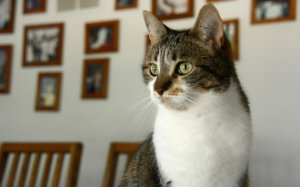16 October 2018
Many animals are particularly sensitive to noise
With the
fireworks season fast approaching, vets are encouraging owners to start
preparing their pets now to prevent possible distress.
At up to 150
decibels, fireworks can be as loud as a jet engine and, with many animals
particularly sensitive to noise, this can be a traumatic and upsetting time of
the year for pets.
If your pet is
severely distressed by fireworks or other noises, the British Veterinary
Association (BVA) encourages you to visit your vet to discuss treatment
options. A phobia of fireworks can be effectively treated with
behaviour-modification techniques, which can achieve long-term success with
professional input and owner commitment and patience.
For
less-severely affected animals BVA is offering simple evidence-based advice to
help owners make informed decisions about their pets' health and welfare this
fireworks season.
Signs of
distress can vary among different animals. While some pets show obvious signs
such as panting, drooling and attempts to escape, there are also more subtle
signs that owners should be aware of, including restlessness and toileting in
the house. Cats often hide while rabbits may keep very still and thump the
ground with their back feet.
Top tips
for pets ahead of fireworks season:
- If
your pet gets severely distressed by fireworks or other noises, contact your
local vet to discuss treatment options - Start
creating a well-padded den for your pet to access ahead of fireworks season so
they have a safe place to hide when fireworks start - Pheromone
products, prescribed by your vet, can be used next to your pets' den and around
the house to help calm them - Ensure
your pet is microchipped and your details up to date on the database, in case
it runs away from home - Move
small pets such as rabbits and guinea pigs to a quiet place indoors - Close
windows and curtains and provide background noise to help mask the fireworks - If
your pet is distressed, remain calm yourself – trying to reassure your pet can
inadvertently reinforce the coping strategy of seeking attention, and
restlessness or toileting in the house can be signs of stress so don't punish
them.
BVA
President Simon Doherty said:
“Fireworks
season can be a magical time for adults and children but the loud noises and
bright flashes can be traumatic for many animals, who have no way of
understanding what is happening.
"Preparation
is key and owners can keep pets calm and safe a number of ways, from preparing
a ‘safe place' for pets now through to microchipping or investing in pheromone
products.
“Even if
you don't expect your pet to be anxious please consider staying close at hand
on the noisiest evenings, providing background noise when fireworks are going
off and, most importantly, staying calm yourself so your animal is reassured.”
“If your
pet gets severely distressed by fireworks, we'd encourage you to speak to your
local vet as early as possible to discuss treatment options, which can achieve
long-term success with professional input and owner commitment and patience.”
BVA is
teaming up with other organisations including Dogs Trust and Blue Cross on 30
October to hold a parliamentary event where MPs and peers will be invited to
pledge their support for a review of existing legislation for fireworks and
their impact on human and animal welfare.
BVA is also asking those hosting their
own fireworks events to be mindful of animals when doing so. Very noisy or
extended displays are more likely to cause anxiety and it is important to avoid
setting off fireworks near horses, livestock or companion animals who may injure
themselves if distressed.



